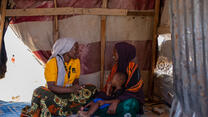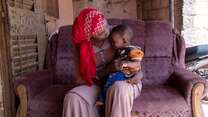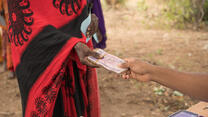WHO WE ARE
The mission of the International Rescue Committee (IRC) is to help people whose lives and livelihoods are shattered by conflict and disaster to survive, recover and gain control of their future. The IRC’s vision is to lead the humanitarian field by implementing high-impact, cost-effective programs for people affected by crisis, and shape global policy and practice by sharing our learning and experience with others.
All IRC programs are designed to achieve meaningful change in people’s health, safety, education, economic wellbeing and ability to influence the decisions that affect their lives. The IRC maintains a dedicated professional Research, Evaluation and Learning (REL) Technical Unit team to ensure that the organization is both outcomes driven and evidence based in its approach.
What do we mean by outcomes?
The IRC has made a commitment to focus on the impact we have on the communities we serve by making measurable improvements in five outcome areas: Health, Safety, Education, Economic Wellbeing and Power.
What do we mean by evidence?
Evidence refers to information that is systematically obtained and analyzed to determine whether, how and why a given intervention works. The IRC identifies, prioritizes and uses the best available information from research studies that indicate and explain causal impact. We generate evidence using rigorous methods that answer the most critical questions for action.
WHY OUR WORK MATTERS
The evidence base for interventions in crisis-affected contexts is thin. Several examples of interventions across disciplines have been perceived to work by experts and practitioners, yet rigorous evaluations have subsequently found little or no impact. In cases where evidence is weak or does not exist, the IRC is committed to generating evidence. Evidence generation strengthens the IRC’s understanding of what works to achieve outcomes in humanitarian settings. It also enables us to promote the implementation of high- impact, cost-effective programs and influence the adoption and scale of such interventions globally.
The IRC is committed to investing time and resources to generate high-quality, meaningful and useful evidence across various contexts, especially where evidence is weak or does not exist. Evidence generation strengthens the IRC’s understanding of what does and does not work to achieve outcomes in humanitarian settings. It also enables us to promote the implementation of high- impact, cost-effective programs to increase our effectiveness and influence the adoption and scale of such interventions globally.
WHAT WE DO
IRC practitioners provide technical assistance to more than 30 country programs. Technical advisors stay abreast of the best available research and practices in their respective fields and share these with the IRC’s frontline teams. They also lead advocacy strategies to encourage partners and policymakers to adopt interventions proven to be effective based on our research and experience.
The IRC partners with multilaterals, international non-governmental organizations and academics from leading universities—such as Harvard University, Columbia University, and the London School of Hygiene and Tropical Medicine—to design and implement rigorous research studies. We share these findings with relevant stakeholders to build the evidence base around what works in crisis-affected contexts, influence policy and shape practice. Our research spans five sectors aligned to our priority outcome areas: Health, Education, Economic Wellbeing, Safety and Power.
Given the scale of the gaps in existing evidence, the IRC prioritizes research that:
- Has the potential to contribute to a large and positive impact in the number of people reached and the degree of meaningful and sustained improvements in people’s lives;
- Allows us to significantly influence research, policy, practice and funding in the humanitarian field; and
- Aligns with our niche; that is, we are well positioned to conduct the research, given the IRC’s portfolio, programming, expertise, organizational priorities, partnerships and reputation.
In line with the above criteria, the IRC has selected four organizational research priorities:
- Education
- Family Violence
- Under-Five mortality
- Cash Transfers
Our organizational research priorities receive proactive support from various departments and are carried out in multiple countries. Developing this global research agenda brings together teams from across the IRC to generate evidence around targeted outcomes and amplifies our voice to achieve greater impact for those we serve.
The IRC is one of few crisis response actors conducting impact evaluations in conflict and post-conflict settings. Since 2006, the IRC has completed, or is in the process of conducting, 78 research studies, including 38 impact evaluations. The number of IRC Country Program teams engaged in evidence generation also continues to grow. To date, the IRC has conducted research studies across 28 resource-poor, crisis-affected countries— including: Afghanistan, Burundi, Chad, Côte d’Ivoire, the Democratic Republic of the Congo, Ethiopia, Haiti, Iraq, Jordan, Kenya, Lebanon, Liberia, Malaysia, Nepal, Niger, Pakistan, the Philippines, Sierra Leone, Somalia, South Sudan, Syria, Tanzania, Thailand, Uganda, Yemen, and Zimbabwe—as well as in the U.S.
In addition, REL Unit team members, along with our academic partners, have produced numerous presentations and publications that share our learning and best practices, including in more than 68 major peer-reviewed publications, thereby contributing to the evidence base for interventions in the humanitarian field.
To promote an internal culture of learning from our experiences, the REL Unit has also developed several resources, including:
- E-learning courses on project design and data collection;
- Workshops to increase capacity on technical aspects of experimental design and implementation, questionnaire development and the use of qualitative methods; and
- A Research Toolkit, which provides templates, tools and guidance on how to design and implement an impact evaluation with the IRC, from developing research questions to budgeting and staffing, data collection and ethics in research.
Finally, to ensure the research we generate upholds the highest ethical standards and considers the contexts in which we operate and populations with whom we work, the REL Unit has spearheaded the establishment of IRC’s Institutional Review Board, an ethical committee that reviews our research to ensure we safeguard the rights and welfare of participants.



